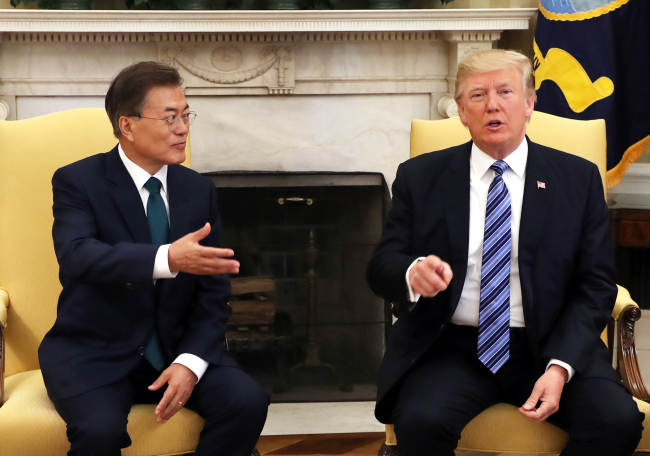South Korean President Moon Jae-in flew back to Seoul on Sunday with a reaffirmed US alliance and renewed momentum to resolve the North Korea impasse, but he left open the controversial issue of Washington’s push to renegotiate a bilateral free trade agreement.
Upon their talks Friday, President Moon and his US counterpart Donald Trump each adopted different tones toward the Korea-US FTA, with Moon emphasizing their joint statement that did not include phrases regarding renegotiation and Trump stressing the creation of a “fair and reciprocal economic relationship.”
Despite US President Trump stating prior to their talks that the two nations were already in the midst of renegotiating the terms of the current five-year KORUS FTA, Moon told correspondents Saturday that all talks of FTA renegotiations were outside the scope of any official agreements reached during the summit.
With room for controversy remaining over the trade deal, the South Korean Trade Ministry said Sunday that it plans to thoroughly examine Washington’s intentions regarding the renegotiation.
 |
(Yonhap) |
“I believe that there was no agreement on renegotiating the FTA at the summit talks. The statement also did not carry such phrases other than efforts to resolve the trade imbalance,” a ministry official was quoted by Yonhap News Agency as saying.
Adding that Trump’s intention of commenting on the renegotiation still remains ambiguous, the official said that the ministry would share and discuss the matter with the team that accompanied Moon to the summit and prepare due measures.
The joint statement released after the summit stated, “President Trump and President Moon committed to foster expanded and balanced trade while creating reciprocal benefits and fair treatment between the two countries. In that regard, the two sides further committed to foster a truly fair and level playing field, including working together to reduce the global overcapacity of such basic materials as steel, as well as non-tariff barriers to trade.”
In order to renegotiate the KORUS FTA, both Korea and the US must first agree to do so, according to the Korean government. Although the scenario is unlikely, some experts say repeated refusals to renegotiate the terms of the deal may lend the US to unilaterally dismiss the FTA all together. The current rules of the FTA stipulate that if any party wishes to terminate the agreement, the deal will be nullified 180 days after notifying the opposing party.
If the Korea-US FTA renegotiation begins, the extent of the new deal might be limited to partial revision, with the US most likely setting its focus and attention on the automobile and steel trade imbalances.
“President Trump is increasing his pressure on Korea-US FTA negotiations, but fully revising the terms of the FTA would not be an easy task,” said Lee Dong-bok, director at the KITA Institute for International Trade.
In the joint statement, the two sides also committed to working together through the Senior Economic Dialogue to promote and expand cooperation on other economic issues, and to explore opportunities through a joint public-private forum. They also agreed to cooperate in cybersecurity, information and communication technology, civil space and women’s economic empowerment.
Before and after the meeting, various interpretations were abound on the two presidents’ discussion on the FTA. During a separate press meeting, Moon noted that the statement made no mention of any trade renegotiation accords.
“All you have to do is look up the content of the agreement (joint statement),” Moon said. “All other talks are outside (the scope) of the agreement.”
Moon revealed that during the summit talks, US officials discussed the country’s trade deficit, especially in the auto and steel industries, hinting at imbalanced flaws in the KORUS trade deal. However, Korea has argued that the steel and automobiles industries are merely a small fraction of the bilateral agreement.
During the talks, statistics from the US Commerce Department were also shared to show the current FTA has mutually beneficial merits including a 12 percent trade volume increase between the two nations.
“There was no (official) agreement, but we concluded discussions with a counterproposal saying if there is still room for improvements in talks about non-tariff barriers, the two nations can establish a working-level task force to further analyze and examine the effects of the FTA,” Moon said.
Trump, meanwhile, highlighted the US trade deficit, saying that the US trade deficit with the South has “increased by more than $11 billion” between 2011 -- when the deal was signed -- and 2016. Trump said the two countries are working to create “a fair and reciprocal economic relationship.”
“We will do more to remove barriers to reciprocal trade and market access. We talked last night and today about some tough trade issues like autos and steel and I’m encouraged by President Moon’s assurances that he will work to create a level playing field so that American workers and businesses and especially automakers can have a fair shake at dealing with South Korea,” Trump said.
According to the Office of the United States Trade Representative, the US has accumulated $10.7 billion in trade surplus in services last year, a 2.6 percent increase from 2015.
Figures from the Korea International Trade Association also showed that Korean industries invested more than $22.7 million in the US from 2012 to 2015, while US investments in Korea stood at $16.3 million during the same period.
By Julie Jackson (
juliejackson@heraldcorp.com)








